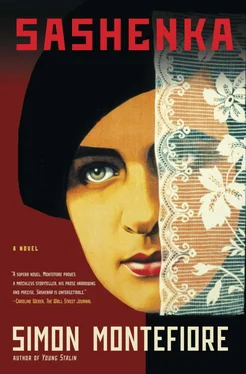Zeitlin cheerfully tossed his hat at the stand. He appeared years younger, radiating confidence. So there! thought Ariadna, the Tsar is back in control. What nonsense the servants talk! Fools! Peasants!
Zeitlin leaned on his cane and looked up at Ariadna like a tenor about to sing an Italian aria.
“I have news,” he said in a voice quivering with excitement.
There! The Cossacks are guarding the streets, the Germans are retreating, everything will settle down again as it always does, decided Ariadna. Long live the Emperor!
On cue, Lala came down the stairs, Shifra emerged from the Black Way and Delphine the cook from the kitchen, her customary drip dangling from the end of her nose.
“The Emperor has abdicated,” announced Zeitlin. “First in favor of the Tsarevich then in favor of his brother Grand Duke Michael. Prince Lvov has formed a government. All political parties are now legal. That’s it! We’re entering a new era!”
“The Tsar gone!” Leonid crossed himself then started to sob. “Our little father—abdicated!”
Pantameilion grinned insolently, twisting his mustache and whistling through his teeth. The two parlormaids paled.
“Woe is me!” Shifra whispered. “Thrones tumble like in the Book of Revelation!”
“What next? George the Fifth?” said Lala. “What’ll become of me here?”
Delphine started to weep and her perpetual drip separated itself from the cozy berth of her nostrils and fell to the floor. The household had waited twenty years for this historic event but now that it had happened, no one noticed.
“Come on, Leonid,” said Zeitlin, offering the butler his silk handkerchief, a gesture that, Ariadna noted, he would never have made a week earlier. “Pull yourselves together. Nothing changes in my house. Take my coat. What time is lunch, Cook? I’m ravenous.”
Ariadna gripped the marble banisters, watching the servants pull off Zeitlin’s boots. The Emperor was gone. She had grown up with Nicholas II and suddenly felt quite rootless.
Zeitlin leaped up the stairs, taking two at a time, like a young man. Following her into her bedroom, he kissed her on the lips so energetically that it made her head spin and then talked about the new Russia. The crowds were still out of control. The police headquarters was burning; policemen and informers were being killed; soldiers and bandits were driving automobiles and armoured cars around the streets, shooting their rifles in the air. The former Emperor wanted to return to Tsarskoe Selo but was now under arrest, soon to be reunited with his wife and children—they would not be harmed. Grand Duke Michael would turn down the throne.
Zeitlin was elated, he told his wife, because many of his friends from the Kadets and Octobrists were serving in Prince Lvov’s government. The war would go on; he had already been commissioned by the new War Minister to deliver more rifles and howitzers; and it turned out that Sashenka was still a Bolshevik. He had seen her at the Taurida Palace with her comrades—a motley bunch of fanatics—but youth will be youth.
“There, you see, Ariadna? We’re a republic. Russia’s a sort of democracy!”
“What will happen to the Tsar?” asked Ariadna, feeling dazed. “What will happen to us?”
“What do you mean?” replied Zeitlin affably. “There’ll be changes of course. The Poles and Finns want independence, but we’ll be fine. There are opportunities in all this. In fact, when I was in the Taurida, I had a word with…”
Ariadna barely noticed when Zeitlin, still babbling about new ministers and juicy contracts, checked his gold fob watch and went downstairs to his office to make telephone calls. Almost in a trance, she followed him out of her room and watched him descend. She heard the Trotting Chair rumble into action.
Leonid rushed to the front door. Sashenka came into the hall, pale and elated, dressed in that plain blouse and grey skirt, her hair in an ugly bun, and no rouge at all. Ariadna was disappointed in her daughter: why did she dress like a provincial schoolteacher? What a sight the child was! She stank too, of smoke, soup kitchens and the people, the rushing gadding people. Even a Bolshevik needed to use powder and lipstick, and why did she refuse to wear her new dresses from Chernyshev’s? A decent dress would improve her no end.
But somehow Sashenka was utterly triumphant, glowing even. “Hello, Mama!” she called up but then, throwing off her fur shuba and boots, she swept on to answer the questions of Lala and the servants. Excitedly, Sashenka told them that the Soviet of Workers’ and Soldiers’ was sitting; that Uncle Mendel was on the Executive Committee. And that Uncle Gideon was there too—he was writing about it—and his friends, the Mensheviks, dominated the Soviet.
Ariadna did not care about this politicking but she could see that Sashenka needed to sleep. Her eyes were red, her hands shook from coffee and exhilaration. Yet as she watched her daughter’s animated face, she saw Sashenka anew. It was as if she had grown strong and beautiful, like a grub eating her mother’s flesh from the inside. Now she was shining with life while Ariadna was lifeless and empty.
Stifling a longing to weep, Ariadna retreated to her bedroom.
Feeling not so much calm as becalmed, Ariadna measured out Dr. Gemp’s opium tonic and swallowed it. But this time it did not work. Her limbs were heavy, as if moving through molasses. The earth seemed to slow down, almost stopping on its axis. Time became excruciating.
She lay down on her divan. She could not rejoice in the news that made her husband feel younger and her daughter seem beautiful; it merely aged her. The ground was splintering beneath her feet. No Tsar; Rasputin dead; Zeitlin had talked divorce; and somehow what most upset her was Sashenka’s joyous luminosity. She was playing grown-up politics, laughing at her parents. She had a mission in life—but what did Ariadna have? Why was Sashenka happy? Why so smug? The clock ticked more and more slowly. She waited for each tick but it took ages to come and when it did, it was like the tolling of a distant bell.
When Ariadna was growing up in Turbin, she knew the Tsars were no friend of the Jews, but the Jews were convinced that without the Tsars it would be much worse. The Tsar was far away and he did much harm to the Jews and to the Russians too, even if his intentions were not too bad. But the Tsar had protected the Jews against the Cossacks, landowners, anti-Semites and pogromists. Now he was gone, who would protect them? Who would look after her? Suddenly she craved her mother’s embrace, her mother whom she had ignored. Miriam was in the same house, so was her father—but they might have been in another universe. To reach them would take an eternity.
The sounds of the household were muffled. She had nothing to do and the nothingness took forever to pass. The world was soaked in blood, just as Rasputin had warned her it would be; the streets of Piter were in anarchy. Outside, she heard tramping feet, hooting cars, cheering and gunfire. The sounds meant nothing; everything had lost its taste; her perfume had turned to dust. Everything, even her scarlet dresses, her sapphires, looked grey.
She rose with a sigh and wandered toward Sashenka’s room. She realized that she had not visited it for years.
Baron Zeitlin was in his study, clanking energetically on his Trotting Chair, a cigar between his teeth. He was sure he could adapt to the new world, indeed he almost sympathized with the socialists. He was vibrating with new plans. Then he heard Sashenka’s voice in the foyer and remembered how he had failed to understand her. Now he must try harder—otherwise he would lose her.
“Darling Sashenka!” She burst in breathlessly but did not sit down. “I can’t believe the last few days. But life must go on. When are you starting your studies?”
Читать дальше












